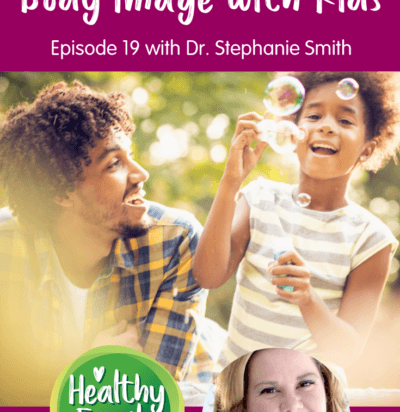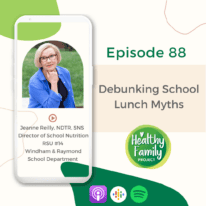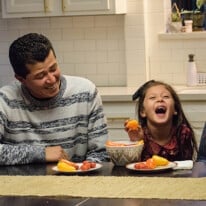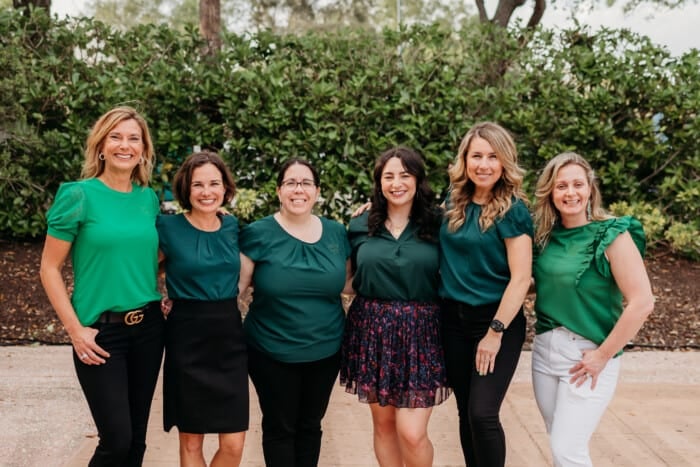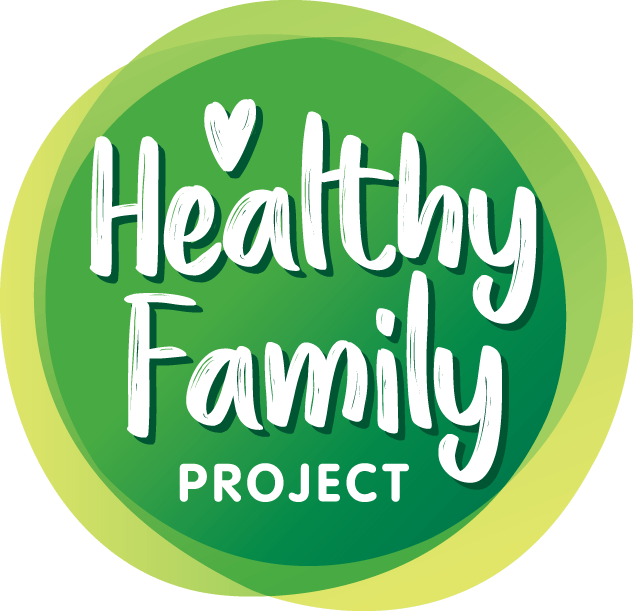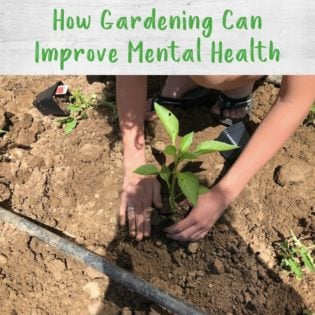Episode 19: Promoting Positive Body Image with Kids
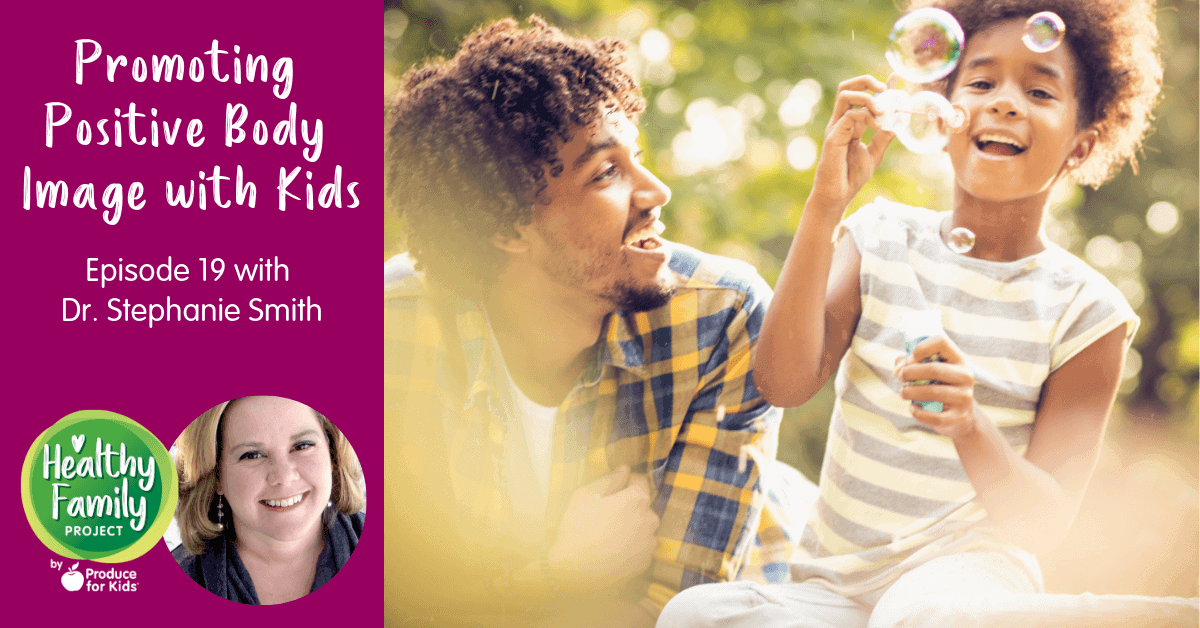
In this episode of Healthy Family Project, we chat with Dr. Stephanie Smith about promoting a positive body image with kids. She shares tips on helping kids understand real vs photoshopped images online or in magazines, how parents can set a good example of body acceptance for kids, parenting kids with different body types and more.
Dr. Stephanie Smith is a mother, clinical psychologist and author of Dr. Stephanie. In her practice, she works with moms, dads, teens and tweens. Dr. Smith uses humor, compassion and common sense to help people make positive changes in their lives. She especially enjoys working with parents to assist them in strengthening their families from the inside out.
On her blog, she writes about technology, parenting, friendship, and pop culture – all with a mental health twist. In addition, Dr. Smith is an official blogger for the American Psychological Association’s blog, Your Mind, Your Body.
Listener Survey!
Thank you so much for supporting the Healthy Family Project Podcast! We’d love it if you could take 5 minutes to let us know how we can bring you the best possible content for future episodes. Take the survey here.
Healthy Recipes & Tips in Your Inbox
Sign up for the Healthy Family Project e-newsletter to receive healthy recipe inspiration, our latest blog posts and more directly to your inbox each week.
Healthy Family Project Facebook Group
Join our Healthy Family Project Facebook group! This group will serve as a safe space for parents and caregivers to talk all about raising a healthy family – from dealing with a picky eater and tips to get more fruits and veggies onto plates to exercising as a family and mental health. We welcome all of you to join in!
Want to skip straight to a hot topic? See time stamps below. But of course, we recommend listening all the way through!
- 2:10 How can parents model positive body image for kid
- 7:21 Tips for addressing body image with kids
- 9:50 Different body types in the family
- 15:22 Preparing for doctors visits and discussion of weight
- 23:10 Body image and social media
- 26:30 How to help kids accept their bodies while undergoing health changes
Relevant Links
- Modeling a Healthy Body Image for Your Kids
- Helping Kids develop Positive Body Image
- Tips for Parenting Kids with Different Body Types
- Ask the Psychologist: Kids and BMI
- Dr. Stephanie Smith’s blog
Healthy Family Project Podcast
Conversations covering hot topics in the world of health, food and family with a dose of fun. Helping families ease their way into a new fresh and healthy world.
Be on the lookout for new bi-weekly episodes and don’t forget to subscribe on Apple Podcasts, Google Podcasts, Spotify or your favorite podcasting site. If you like an episode, make sure to leave a rating and comment.
If you are interested in being a guest on the Healthy Family Project podcast, contact amanda@healthyfamilyproject.com with your topic idea for consideration.
Transcript for Episode 19
This transcript was produced by Otter.Ai. Please forgive any misspellings and grammatical errors.
00:15
Welcome to the healthy family project by produce for kids, covering the hot topics in the world of health,
food and family with a dose of fun. Today we are talking about a truly ever changing topic body image.
I’m really excited to talk to our friend Dr. Stephanie Smith, psychologist, mom and author of Dr.
Stephanie smith.com, about how we can promote a positive body image with our kids. So Dr. Stephanie
has a wide range of expertise. And while the topic of body image does come up with her clients, it’s
important that we know that you should always check in with your family doctor or specialist when it
comes to these health related issues. Today’s conversation is going to be a mash up of advice from both
Dr. Stephanie’s role as a psychologist and also what has worked for her as a mom. Let’s get started with
today’s topic. Welcome back, Dr. Stephanie, I’m excited to jump into today’s topic, all about promoting a
positive body image with kids. This is an important and of course, ever changing topic as we raise
healthy kids, but also, you know, for us as adults to keep in mind, I know getting older, you know, you can
sometimes look in the mirror and you’re like, wait a second, that’s not what I look like. So probably some
good tips that we can we can take as parents as well. So we’re all bombarded with ads, these highly
altered celebrity photos on social media, TV shows telling us, You know what the perfect body is, I
guess, you know, just the internet anywhere. It’s all coming at us in different directions. So I feel like it’s
just impossible to live up to these standards being set forth and flashing in front of us. So how can we as
parents model positive body image for our kids?
02:12
That’s a great question. And a big question. I guess first of all, I want to talk about just what you
mentioned, social media, traditional media, having all of these images and words, telling us what we
should be and shouldn’t be. I think one of the first steps is starting with that actually, and working
ourselves as the parents but and also working with our kids on social media and media literacy. And what
that means is understanding that what we’re seeing online or in glossy magazines, those are doctored
images. Those are Photoshopped images, those are not reality. We can enjoy those images, enjoy the
clothes and the makeup and the hair, even the body. But understanding that that’s not the same thing
that we see in the halls of our school, or in the cubicles in our office. It they’re they’re totally separate
thing, things. Just like we sometimes joke about romantic comedy movies, those are really fun to watch. I
love to watch my watch them all day long. But I also have the recognition that’s not reality. It’s fun. It’s
fiction, it’s it’s just does not mirror real life. And in the same way, becoming literate about social media in
particular. We understand that we help our kids understand that that’s it’s not reality, it’s not the same
thing. Some schools are actually teaching this. My kids take a class called digital citizenship. And I think
a lot of schools are starting to do that recognize that we need to teach our kids about how to absorb the
information they’re seeing online how to interact with people online how to deal with technology. So I
really think that’s the one of the first big steps and helping our kids have a healthy body image.
04:26
You know, that’s, that’s really good tips. And I have to say I, I messed up a little bit as us as we as
parents often do, as as an example. I kind of retrace my steps, there’s these apps, you know, that help
kind of remove the wrinkles on your face. And you know, just you can go in and whiten your teeth or do
these fun things. And so some of my friends had shared this app with me and I had downloaded it to my
phone and was using it here and there. And, you know, one day I came upon my 12 year old with a
photo of herself, and she was whitening our teeth and, you know, bringing her waist in a little bit, which I
was far beyond my capabilities. But I thought, Oh, my goodness, I am setting the worst example ever for
my child. And so I talked to her about it. And I told her, I said, I’m gonna delete this, because like, I
learned something from this experience, like, I don’t need to do that, although I kind of miss it. I was like,
I need to show her that I am comfortable with who I am, in order for her to be comfortable with who she
is. And so that was a huge learning experience for me to do in the digital realm, I guess, because we’re
on that topic.
05:45
Well, I don’t know that that’s a mistake, so much as it’s a great example of reality versus not reality. I
mean, just like on Snapchat, people add little cat ears or whiskers or scary feet. I mean, it’s, it’s just
another example. But whether it’s filters or photoshopping, or whatever, it’s just, it’s not reality. And I think
having that conversation I have with ourselves and our kiddos like, you know, whatever, you know, this,
this is a different realm. This is a different realm. It’s not attainable, my teeth are never going to be this
way. You know, I’m never going to grow cat ears. You know, so I think, yeah, don’t beat yourself up. I
think it just it happens and talking through it is the most important thing.
06:42
Yeah, that’s what we did. We kind of use I use it as a learning experience. And I just, you know, said,
See, this is what I mean, when I tell you that the things that you’re seeing aren’t necessarily, you know,
the real deal. This is exactly what I’m talking about. So Well, it seems like girls and women seem to be hit
the hardest when it comes to body image, but but boys deal with it, too. So I guess this could be a
lengthy and the answer, but what general tips do you have when it comes to how parents should address
body image with their kids? No, that’s could be a book. And then in specifically, are there different tips for
boys?
07:23
Um, I think that’s such a great question. And even just realizing that doesn’t matter what gender or what
orientation of any kind, we all have our insecurities, and can all fall prey to body image struggles. I think
you’re right. I mean, even when I was in school, graduate school, 15 years ago, there, we never talked
about men and boys having an any kind of body image. Issue, even being aware of body image, which of
course is ridiculous. They do just like women and girls. You know, maybe there’s different body parts that
are highlighted or whatever, but they’re humans just like, just like we are. And so I think, you know, just
being careful, no matter who our kids are, who we are, to understand that everybody is sensitive to it, or
can be, you know, so being careful not to joke or poke fun. Too much or ever about people’s bodies.
Even little kiddos, you know, I think is a good is a good first step. Again, boys, girls or otherwise, you
know, I think realizing that it can can affect everybody.
08:53
Yeah, I think I think that’s a really good answer on that front. I mean, just understanding that because I do
think that when you think body image, everybody automatically goes to girls and thinks about girls. And
so I think that just recognizing that it is across genders and to be cognizant of it, and not make fun or
think you know, just to just to realize that that it matters to everybody is I think what we need to do.
09:26
Yeah, yeah, for sure.
09:30
Well, okay, so what about different body types? We I have a friend with who has two boys and one who
can’t keep the weight on and the other who is very sensitive about his weight, you know, I can totally see
the, you know, well, he’s eating everything I’m eating you know, why does do they look this way? And I
look this way. So what advice do you have on that different body types in the family?
09:55
That is the question dear to my heart. I think a lot of families struggle with that. You know, I guess the first
tip as a mom and and psychologist would be, it’s okay to kind of hear that and sit with that it does suck.
Life is not fear that, you know, abilities are not even across the spectrum, whether it’s body strength or
brain ability, or whatever. And it’s hard, it’s hard to live with someone that you feel like, has more than
you do, or is more able or capable. Um, so, like, so I guess the first step is, you know, if your son or
daughter comes to you and says, you know, it’s not fair that she gets to eat whatever, he doesn’t have to
worry about this or that, like, it’s okay to sit with that and say, Yeah, I get it, that it’s hard. It’s really hard
because it is, um, I think our first instinct sometimes as parents is to be like, Oh, it’s okay, you’re, you
know, kind of tamp down that emotion, but it’s okay to let, let that emotion get expressed. And, and sit
with it, because I think if we as parents can show that we can sit with our kids emotions and, and help
contain them and feel them and not freak out. That’ll allow them to learn to do the same thing. Like, oh, I
can feel this emotion. And it’s okay, I’m going to come through the other side. Um, so that’s the first tip.
The second tip, which is more kind of behavioral in nature, and more as speaking as a mom. I recently
took my two older girls to a women’s collegiate basketball game, which we love to do, we live in a college
town. And but I was particularly struck, when we were there recently about the different body types that I
was seeing on the court. I mean, these were not body types that you see in the fashion magazines or
blogs, these were tall, strong, women, who also happened to have skin and hair of all different colors,
and textures and sizes. And I felt I my children did not say give me any feedback at all, but I felt like a
good mom, showing them, wow, look at all these wonderful bodies that are doing such great things. And
I reflected back to earlier, when the fall, we’d gone to a cross country meet with the same university. And
those women had totally different types of bodies, different types of skin, different types of hair, but we’re
just as strong and empowered. Um, so I happen to take my girls, and I think you could do the same thing
with boys, just giving them the opportunity to see all different kinds of bodies in motion, doing work, doing
wonderful things, um, I think is a great, a great, pretty easy thing to do.
13:23
That is that’s a, that’s an excellent tip, because I’m sure people everywhere have some kind of
something along those lines that they can, can take their kids to, to see fairly inexpensive. I know for us,
we’re over at the at the Tennis Association a lot of the time. And, and I agree with you that when you go
you see, you know, these strong women and men doing, you know, playing this sport, and they are not
the usually the ones that, like you said, are featured in these different things. So that is a really great tip.
13:59
Yeah, and I don’t know that I would have thought about it before. But we we all have different bodies, and
they all Excel or don’t excel at different things. So just showing them that I think can really broaden minds
and help with body image, hopefully overall.
14:23
Awesome. Alright, so this is this was I had a little experience with this question myself, but this came
from someone on our team, I produce for kids, but I can I can certainly relate. So I am really excited to
hear what you have to say about this question. So how should parents prepare for doctor’s visits where
you feel like white weight might be discussed? I know that you and I had talked a little bit I think you even
and we’ll link up to I wrote for us about the BMI and talking to your kids when they receive the BMI. rating
or results. So, anything we should talk to our kids about beforehand, when you’re, you’re off to a doctor’s
visit that you feel like weight might be discussed?
15:14
Well, I guess first, it’s important to say I think it’s really healthy and appropriate that physicians and
primary care providers are talking about weight and activity more, because I do think that’s an important
piece of overall health. However, I hear what you’re saying that for kids and adults alike, sometimes that
can be were worse than getting a shot, you know, having those conversations about weight, in terms of
dread and a pain. So I guess, what, what I might recommend is just talking about it beforehand, trying to
be prepared. You know, what, you’ve got your doctor’s appointment coming up, it’s important that they
check out all different areas of your functioning, your mental health and your height, and your lungs and
your heart. And one of those areas is weight, and we’re probably going to talk about that. And so just
having some preparation. I do think, you know, it’s, it’s important to let kids know that hopefully, the
doctor’s office is a safe place to talk about things that are difficult. But also not feeling shamed. If the
number on the scale isn’t what a chart says it should be. Um, so I think sometimes just doing that, ahead
of time conversation can alleviate some of the pressure. I think if you’ve had a difficult time in the past
with the physician or primary care provider, it can, you could even call ahead and say, Gosh, my, my
daughter, or my son is worried about this conversation. I’m worried about what the scale might say, or
worried about what you might say, How can I prepare them? How can we work together to make this a
good experience? I don’t think there’s anything wrong with that. And in fact, I think the provider would be
thrilled to work collaboratively with the parent, to make it a good experience. Of course, that’s what what
they all want. So those might be to ideas, talking about ahead of time, and then if need be collaborating
with the provider.
17:47
I like that. And I think that it’s, it’s probably important regardless, if you know, as your your kids grow, to
talk before the visit, about what they can expect, you know, even if it’s just on the drive there, just to
remind them, you know, because I know as they get older, they doctors have to look at different areas.
And, and so it’s probably always good to have those conversations on your way to the doctor and remind
them, you know, that they will be talking, they will be looking at their weight and their height and checking
all of that out. And I think that, also calling ahead to if you are having that, you know, ongoing
conversation at home, and you’re seeing it, maybe just letting them know, whether it be weight or
anything else, you know, calling ahead and saying, Listen, this has been a touchy subject, we’re coming
in it, you know, I just wanted to call ahead and kind of give you the background on it before we’re there.
Because I know in in the, in the moment, it can be a little stressful and you know, hurtful, like you said,
for kids of any age, really. But I know, I relate closely with the the late elementary and now into middle
school years where where I am with my older daughter.
19:05
Yeah, and I really do think if you reach out to the provider’s office and ask for tips or strategies, or how
can we make this better, they’ll be so excited to work with you. Again, like you said, whether it’s about the
weight issue or the vision test, or the immunizations or whatever, you know, they want it to be a good
experience and they’re really invested in having the kiddos feel like it’s a safe place and they’re a safe
person to talk to. And I don’t think you you would be being a nag or annoying to make that phone call.
19:43
Right. Well, awesome. Good tips there. So I think we covered off on on this topic but I’ll I’ll bring it up one
more time because it is such a hot topic. Probably more for the tweens and teens like like you and I are
working through that. That stage right now. So is there anything else that you recommend? I love the
idea of what was it digital citizenship, I’m actually gonna bring that up with my daughter school because I
think that I talk about personal brand I come from, you know, that background, so my daughter gets a
little annoyed with me where she’s like, I’ll put I’m not a brand, you know, and I and so she’s like, you’re
not Mark, I’m not marketing myself, you know. So I’m like, Oh, I gotta come up with a different a different
title for this, because she’s, she’s, you know, not liking that I constantly remind her, you know, what
you’re putting out there who’s looking at these things. You know, what we did in our house, for, you know,
Instagram, when she started down that road, of course, she has a private account. You know, she’s into
theater, she has friends from all over, it’s a way that they keep in touch. And so I said, Alright, let’s start
with Instagram, and let me be involved, like, let’s do it together, you can have it, but I’m going to be a part
of it not so much like, you know, stalking you or, because that’s our word. But more along the lines of,
let’s see what you’re going to post, let’s think about what caption you’re gonna write, let’s think about
who’s looking at this, you know, and also, who is asking to follow you. And that was another big thing, if
she was going to have the have Instagram that there would be if she got a follow request, we would look
at it and say, How do you know this person? Like, how does this makes sense that you’re interacting
with, you know, whoever it might be? And I would, like she would think about it. And she would have to
say, well, this is so and so I know them from here, you know, and then we would decide together. And I
and I even know now it’s been some time, she still does it, she still shows me who is requesting to follow
her. And she’ll be like, you know, decline. Like, I don’t know who that is. So I love to see that. See that
that process, even though it took some time. And I know, as busy parents, it’s like, so overwhelming. But
for me, that’s what worked, it was starting with one, you know, starting with one platform and really taking
the time to go through it and work on it together where she wanted to have it. But those were my roles,
you know, for her having that. So that’s really what worked for me. But do you have any, you know, other
tips for parents when it comes to social media and what kids are seeing specifically on social media? I
can tell you, you know, there’s angles, you know, you probably know about this where you’re you’re
posing a certain way, or you have a look that these celebrities are taking pictures of themselves. And I’ve
noticed some of those popping up in some of my daughter’s, you know, her stance in different photos. So
how can we really help? The kids feel good, we can’t hide from this. So how do we work with it? I guess,
instead of against it.
22:59
Well know, I looks different. For every family, what, what specifically works and what doesn’t work. I
guess my overarching tip would be to just be involved some way, we’re gonna screw up, and we’re
gonna have to rethink, and we’re gonna have to backtrack and whatever. But if I think if we as parents
are just involved, and putting in the time to try to understand what they’re looking at, and why and talking
to them about it, talking about our own experience, is with social media. Um, I think that’s the best thing.
We’re not gonna we’re not gonna hit perfection. There’s no parenting perfection. Um, but I think if we’re
just involved and engaged as much as we can be. I think that’s the sweet spot.
24:03
Yes, and, and really, and we talked before, before recording today, which is hilarious, that maybe we
should have my daughter, your daughter, someone, one of the youngsters Come on, and we could
record with them. And they could tell us all about social media.
24:22
And that’s, I mean, it’s kind of a funny thing. And we all know, they’re more expert at dealing with the
technology than we are, but there’s embedded in that there’s something really powerful if we ask our
seventh graders or fifth graders or even kindergarteners, like, teach me about this, tell me what you’re
doing. There’s so much power in that in the parent child relationship versus it always thing. I’m going to
tell you what to do. I’m going to tell you how it is, um, let let them be the teacher. Let them be the guide.
Of course, you’re always still in charge, but I think that especially as our kids grow, letting that
information, go back and forth both ways, I think is super powerful. And that that can be a good piece of
just being present, just being involved being engaged with our kids. I just think that’s the best thing that
we can do.
25:21
I agree. So, I work with a local hospital here in Orlando, every summer Well, now we’ve kind of expanded
it to several times year round, which is awesome. But so we there’s a camp for families who’ve had a
child diagnosed with the chronic condition. So we spend a certain, you know, six, six weeks over the
summer exercising, it’s every Saturday, discuss nutrition, and more. And so a lot of these children are,
are have been, you know, diagnosed with obesity as as their condition. And so they’re on a path. But I
feel like the body image and acceptance is important for these kids to do you have any advice on how
they can accept their body while undergoing health changes?
26:13
Oh, if I have great answer to that, I would be able to change the world, I think that is, that’s super, super
challenging. Um, and I guess the main thing that comes to mind is really being mindful of the words we’re
using and the tone that we have. In talking about exercise, and food and nutrition, we do those things to
care for our body, and to make our bodies strong, and to help our bodies do what we want them to do.
So maybe that’s playing soccer, or maybe that’s being able to, I don’t know, keep up with our friends or
learn how to ride a bike, or just be more comfortable as we’re painting or whatever it is, I think, taking
that kind of functional approach and using more functional language separating the separating that from
like saying, Oh, we’re going to eat healthy, so we can fit into a certain pair of pants or look a certain way.
Most of us know, that’s not so great. But sometimes our words are slow and making that adaptation. So
just like I said, being really careful with the words we use, and when we’re talking about food and
nutrition, and, and activity, making sure that it’s all for a functional reason, and not for like an Stetic
reason. And I think it’s also important to be to take time, this might sound really kind of cheesy, but take
time to be appreciative for the bodies, we have no matter what their ability, or disability or condition or
whatever. Recognizing what they do for us, and, you know, having some sort of gratitude, or at least
recognition of that is important too, because they, they are doing great things for us. They’re letting us
live and be in the world. So that might be I don’t know, no, more. No. But that makes,
28:47
that makes a lot of sense. And we really try you know, in the camp to, to follow along with that. And, and I
do with my kids and, you know, I really, I tell them all the time, you know, and it’s hard but it’s healthy is
not associated with thin or, like you said, fitting into a certain pair of pants and healthy and, and being
you know, eating nutritious things is totally different from being thin, like, What’s our goal is to be healthy,
and everybody has a different body type. And if you’re healthy, then that that’s what really matters, you
know, you could be stick then and not be healthy. Not be eating the right thing not be putting the right
things into your body. And so I think that just kind of removing that correlation with the two and in also
with these kids. I think it’s important for us to celebrate, you know, small small wins and and maybe not
like base everything on Okay, get on the scale this week. All right, where are we at? You know, obviously
it’s a goal for a lot of these kids health wise that They do need to lose the weight. And so other things
besides weighing in, you know, not folk putting full focus on that, that weigh in aspect of it all, I think is
really important, important as well.
30:15
Yeah, I mean, I think this year, you’re hitting an area where we as mental health and physical health
practitioners, we have some work to do in in, in understanding how to blend these two things in in a
healthy way. But the, you know, body size, body image, nutrition, overall health fitness, we were not great
at it yet. And I think we’re still the same. I feel like I’m fumbling for words, because it’s a work in progress.
How do we marry these two things? I’m not sure we’ve figured out a great strategy yet. So work in
progress.
31:05
And I can tell you with these kids, one of the first things we ask every week is how do you feel as
compared to, you know, so I think that they, especially making these big changes, see how they feel. And
that’s like, something, you know, that’s like, wow, I’m not so tired. Or I’m, you know, these ways that they
feel are so different. That I feel like that’s, that’s a really good gauge with them and has resonated with
that group.
31:33
Oh, interesting. Just how, how, how it feels to live in your body?
31:37
Yeah, how do you feel and you know, making these different changes in their diets, you know, like, not
eating the chips every day, they’re totally feeling a different way. I feeling healthy. You know, I think I
typically, I have a, I know when I veer off, I should say, when I veer off track, I recognize, you know, my
body is like, sluggish, and all these things. And then when I get back on track, I say, okay, you know, that
was fun, quote, you know, to kind of indulge and have these things that I don’t normally have, but at the
same time, recognizing how I feel, when I am on the right path, or, you know, my path, I should say, and
knowing how I feel, then it’s like, okay, this is why I do what I do.
32:28
That’s great. That’s a great example.
32:31
Yeah. Well, I am so glad that we got to talk to you today. I know we have a blog post that you wrote for
produce for kids that we’ll be linking up to. And a couple other good link reference links for anybody who
is interested in learning more about body image and kids and will link up to some of Dr. Stephanie’s other
podcast episodes and blog posts as well and her awesome website, but do you have social media or
anything else that you’d like to share where people can kind of seek you out?
33:10
Um, the main way that I communicate is via Twitter. So that is at Dr. Steph SDE pH Smith.
33:19
Okay, wonderful. And then your website as well. And like I said, we’ll link up to that. Well, great. I’m so
glad to talk to you today on this topic. And I’m sure we’ll be talking again soon. If you’re listening. Please
always feel free to reach out to us if you have a topic you’d like for us to touch on with Dr. Stephanie. And
we can definitely get it. Get it on the calendar. Thank you for joining us today.
33:46
Thank you so much. I enjoyed it.
33:50
We have two other great healthy family project episodes from Dr. Stephanie, including episode three,
where we talk about managing screentime, which I know is definitely a hot topic with families today. And
then episode eight for managing back to school anxiety for both kids and adults. You know, it’s not just
the kids that worry about getting back to school. We also have regular content from Dr. Stephanie on
produce for kids.com. And coming soon a blog post that includes tips on staying on track with those New
Year’s resolutions. Tis the season for for some of us to be falling off the wagon, so she’s gonna let us
know how we can stay on track. So definitely go to the blog and take a look at that. That’ll be coming
soon. And then I did mention BMI in this episode. So that’s body mass index. So if you’d like to learn
more about BMI, some of the kids this is the test their body mass index in schools and it kind of pops up
as you get into elementary school. And something that I was was kind of in the dark on and Dr.
Stephanie was able to shed some light so really how to talk to your kids about BMI. You can go to the
show notes, we’re actually going to link up to that blog post there. But you can also go to produce for kids
calm and it’ll be in the mix with all of Dr. Stephanie’s blog post. And then just a reminder talking about
New Year’s resolutions if you’re looking to stay on track with healthy recipes, we do have more than 400
Registered Dietitian approved recipes available for free at produce for kids calm and those are breakfast,
lunch, snack and dinner. And I promise you know they’re family tested a lot of those we eat at our at our
own homes here at produce for kids. So kid tested, family approved, go and check those out and let us
know what you think. And of course you can find produce for kids on Facebook, Twitter, Instagram,
Pinterest, and YouTube and we’d love to hear from you. And if you want to chat with me direct I should
say tweet with me direct. You can find me on Twitter. It’s Amanda M Kiefer. Be sure to subscribe talk
soon.

